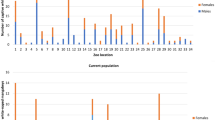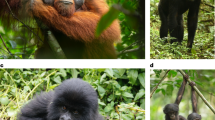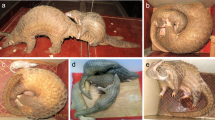Abstract
THE International Primatological Society1 and several recent publications2–8 have pointed out the urgent need for conservation of non-human primates. The capture of live primates for exportation is a major drain on natural populations and breeding programmes are a vital need which has been emphasised by two recent events. First, the Institute for Development of Renewable Natural Resources in Colombia has established limits and standards for the hunting of non-human primates9. Second, a large scale, international research project has been launched through a grant from the US National Institutes of Health to the Institute of Laboratory Animal Resources of the US National Academy of Sciences, which will tackle critical questions of supply and demand, and seek to identify primates which must be bred to meet research requirements10. (In 1969, 16,295 New World primates and 42,514 Old World primates were sold in the United States solely for research3.) We report here preliminary results of the first attempt at large scale, controlled breeding of New World primates in the natural habitat of an exporting country, and discuss the feasibility of future projects.
This is a preview of subscription content, access via your institution
Access options
Subscribe to this journal
Receive 51 print issues and online access
$199.00 per year
only $3.90 per issue
Buy this article
- Purchase on Springer Link
- Instant access to full article PDF
Prices may be subject to local taxes which are calculated during checkout
Similar content being viewed by others
References
International Primatological Society, Fourth meeting Fourth meeting, Appeal for the conservation of nonhuman primates, Portland, Oregon (1972).
de Avila-Pires, F. D., Int. Zoo Yearbook, 12, 13 (1972).
Harrisson, B., Conservation of nonhuman primates in 1970 (Karger, Basel, 1971).
Southwick, C. H., Siddiqi, M. R., and Siddiqi, M. F., Science, 170, 1051 (1970).
Survival Service Commission, Red Data Book (International Union for the Conservation of Nature, Morges, 1972).
Thorington, R. W., Int. Zoo Yearbook, 12, 18 (1972).
Thorington, R. W., The Importance of Nonhuman Primates for Man, delivered at III Congreso National de Biologica, Iquitos, Peru, November (1972).
Warland, M. A. G., Int. Zoo Yearbook, 12, 16 (1972).
Resolution No. 0392 of April 18, 1673, whereby Standards for Hunting Non-Human Primates are Established (Institute for the Development of Renewable Natural Resources, Bogota, Colombia, 1973).
Marx, J. L., Science, 181, 334 (1973).
Tsalickis, M., Int. Zoo Yearbook, 12, 23 (1972).
Jerkins, T., in Breeding Primates (edit. by Beveridge, W I. B.) (Karger, Basel, 1972).
Sponsel, L. E., Brown, D. S., Bailey, R. C., and Mittermeier, R. A., Int. Zoo Yearbook, 13 (in the press).
DuMond, F. V., in The Squirrel Monkey (edit. by Rosenblum, L. A., and Cooper, R. W.) (Academic Press, New York, 1968).
Author information
Authors and Affiliations
Rights and permissions
About this article
Cite this article
BAILEY, R., BAKER, R., BROWN, D. et al. Progress of a breeding project for non-human primates in Colombia. Nature 248, 453–455 (1974). https://doi.org/10.1038/248453a0
Received:
Revised:
Issue Date:
DOI: https://doi.org/10.1038/248453a0
Comments
By submitting a comment you agree to abide by our Terms and Community Guidelines. If you find something abusive or that does not comply with our terms or guidelines please flag it as inappropriate.



